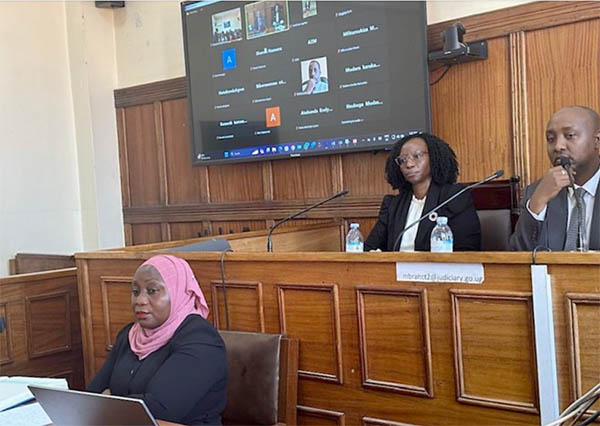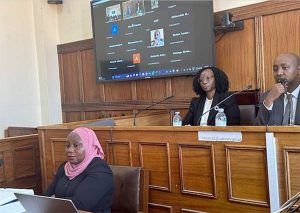Access to justice: “Today it’s me, tomorrow someone else”


COMMENT | Olivia Nalubwama | An online petition by a section of Christians on behalf of embattled former Kampala Capital City Authority (KCCA) executives facing prosecution over the Kiteezi garbage deaths sent me down memory lane.
The petition questioned the arrest and detention of former KCCA executive director, Dorothy Kisaka and her two co-accused. Directed to President Yoweri Museveni, the petitioners highlighted the “deep need for introspection as a nation of the Justice, Law and Order Sector.”
As of November 11, at least 2,000 people had signed and supported the petition. Sometime in 2011, a dear friend found himself in unpleasant circumstances due to his bleeding generosity. He had signed as a guarantor on a loan agreement for a relative. When the said relative defaulted, the lender turned his guns on the guarantor.
There was my hapless friend doing that Ugandan thing of checking on his upcountry enterprises when he was accosted by several brash court bailiffs. The bailiffs yanked him unceremoniously by his trousers and shoved him like a sack of sweet potatoes onto those banged-up police patrol vehicles.
We deemed ourselves upcoming uppity Kampala folk – working hard at our jobs (for the lucky ones), battling Kampala’s snarling jams and drunken master roads to and fro our homely residences, nicely sequestered from the lived experiences of thousands – ‘the other’. Thanks to my friend and his generosity, we earned a glimpse into the mundane struggles of thousands of Ugandans.
The petition questioned the arrest and detention of former KCCA executive director, Dorothy Kisaka and her two co-accused. Directed to President Yoweri Museveni, the petitioners highlighted the “deep need for introspection as a nation of the Justice, Law and Order Sector.”
As of November 11, at least 2,000 people had signed and supported the petition. Sometime in 2011, a dear friend found himself in unpleasant circumstances due to his bleeding generosity. He had signed as a guarantor on a loan agreement for a relative. When the said relative defaulted, the lender turned his guns on the guarantor.
There was my hapless friend doing that Ugandan thing of checking on his upcountry enterprises when he was accosted by several brash court bailiffs. The bailiffs yanked him unceremoniously by his trousers and shoved him like a sack of sweet potatoes onto those banged-up police patrol vehicles.
We deemed ourselves upcoming uppity Kampala folk – working hard at our jobs (for the lucky ones), battling Kampala’s snarling jams and drunken master roads to and fro our homely residences, nicely sequestered from the lived experiences of thousands – ‘the other’. Thanks to my friend and his generosity, we earned a glimpse into the mundane struggles of thousands of Ugandans.
In true Ugandan fashion, our formerly distant relative sighed and jeered over the trickery of debt collectors. More urgently, he knew someone in the district office. A friend of a friend who lived near the police station could assist. Mobile money changed hands – necessities were promptly procured. Our man in the police cell could at least brush his teeth.
The following day, our crash education continued calmly. A day in the meandering life of the district magistrate’s court. By this time, we had raised some ka money towards the loan repayment. We had hightailed out of Kampala alongside the lawyer, keen to be at the district court by 9am. By 9am, there was no sign of the court commencing.
The long faces of ‘the other’ waiting on the court told us everything. We knew nothing, controlled nothing. Our friend had also not yet been brought to court. Our insular lives were scattered. How did we become the ‘the other’? The lawyer, as cool as his gleaming Mercedes Benz, swapped jokes with the magistrate staff as money changed hands – ‘facilitation’ for lunch/soda/chai- something to aid the constipated digestion of public services that ambled on the whims of corruption and inefficiency.
Newly aggrieved, we found our inner activist as we raved about injustice, astonished by the alternate Uganda we found ourselves in. Our ‘what ifs’ mounted. What if the magistrate did not turn up? What if the court remanded our friend?
Eventually, court did start – our friend was released. Relieved, we quickly moved on. Glad to return to our comfy lives. Of his brief incarceration, our friend validated reports about the overcrowded and terrible state of the holding cells. He recounted meeting a young man who claimed he had been in the police cell for months beyond the constitutionally mandated 48 hours of detention.
His relatives, too poor to raise the money, required to chase down justice for him. Dear reader, the 11th Annual Report on the State of Equal Opportunities in Uganda FY2023/24 is elaborately grim. The leading barrier affecting access to justice is the long distance to courts. For many Ugandans, ‘the other’, the courts are simply too far.
The report states, “Only 18.2 per cent of the people in the rural areas have access to a Magistrate Court within less than 5km and residents must travel long distances to get justice.”
Years later, guilty at how swiftly and conveniently we forgot that young man, I wonder about him. How many more remain ‘stuck’ without anyone on the outside advocating for them? No nifty lawyers navigating the bulky wheels of justice, no pious Christians waking up to the reality of injustice all around them, no uppity Kampala folks stepping out of their cushioned lives to rescue him/them.
In April 2023, during the infamous Karamoja iron sheets scandal, the state minister for Planning Amos Lugoloobi, spent three days in jail over the mismanagement of the iron sheets. Out on bail, he held a thanksgiving at his residence in Kayunga district where he remarked,
“I think God planned that as minister for Planning, I had to be arrested and subsequently remanded to Luzira prison so that I witness the bad situation in jail and work towards improving prisoners’ lives.”
Experience is a wonderful teacher until time sets in, whittling away the grip of bad memories. We humbly await the fruits of Lugoloobi’s experience. As the late great Philly Bongoley Lutaaya sang, “Today it’s me, tomorrow someone else. It’s me and you, we’ve got to stand up and fight.”
In this day of ‘bang the tables’, we must refrain from the insular temptation to bang the tables for only those who look like us, agree with us, worship like us – sequestered and privileged. Fight for ‘the other’ today so that tomorrow, if/ when it’s me or you, we will hopefully find the wheels of justice moving efficiently, and equitably for all.
*******
 Olivia Nalubwama is a “tayaad Muzukulu, tired of mediocrity and impunity” smugmountain@gmail.com
Olivia Nalubwama is a “tayaad Muzukulu, tired of mediocrity and impunity” smugmountain@gmail.com
THIS ARTICLE WAS FIRST PUBLISHED IN THE OBSERVER
The post Access to justice: “Today it’s me, tomorrow someone else” appeared first on The Independent Uganda:.





